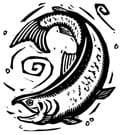Pesticides and salmon don't mix
by Erika Schreder, M.S., Staff Scientist, Washington Toxics Coalition
This article was originally published in May 2001

When a homeowner uses weedkiller to kill dandelions, when highway departments spray roadside vegetation, or when farmers apply insecticides to kill insect pests, the result is often that toxic pesticides find their way to our waterways. The evidence is strong that this contamination is causing harm. The U.S. Geological Survey has detected 15 pesticides in local waters at levels exceeding standards set to protect aquatic life. Government agencies have documented this problem, but have responded with nearly complete inaction, until now.
The listing of salmon under the Endangered Species Act means any act that harms salmon or impairs their ability to survive is now illegal. Meanwhile, the National Marine Fisheries Service (NMFS), the agency charged with determining which actions harm salmon, states serious concern about the impact of pesticides on salmon. Pesticides are known to have myriad impacts on salmon and their food supply. Recently, NMFS published a study showing that the widely used insecticide Diazinon can interfere with the salmon’s sense of smell, crucial for behaviors like predator avoidance and finding their home stream.
The U.S. Environmental Protection Agency (EPA), which has responsibility for pesticide regulation, has failed in its duty to protect salmon from pesticides. Consequently, several groups including commercial fishers and the Washington Toxics Coalition have filed suit to force the EPA to take action.
Locally, Seattle and King County have taken proactive action by ending in 2000 use of the most hazardous pesticides, including those with known toxicity to fish. Now, a state Endangered Species Act Pesticides Task Force, a multi-agency effort, promises a comprehensive approach to protecting salmon from pesticides. The task force has drafted a strategy to determine which pesticides harm salmon.
The state process, if well implemented, could prove a groundbreaking approach to protecting species from the impacts of pesticides. You can help by writing to the Washington State Department of Agriculture (WSDA) during a 60-day comment period. Comments must be received by May 29, 2001.
Tell WSDA:
- The current widespread contamination of our rivers and streams is unacceptable;
- Pesticides are in our rivers and streams at levels that can harm salmon and this must be stopped;
- WSDA should be applauded for initiating a process to address this problem;
- WSDA must take strong action to restrict pesticides that contaminate salmon streams.
Address your comments to:
Bridget Moran
Endangered Species Coordinator
WA State Department of Agriculture
P.O. Box 42589
Olympia, WA 98504
bmoran@agr.wa.gov
Contact Erika Schreder at 206-632-1545 x19 or eschreder@watoxics.org for more information.
